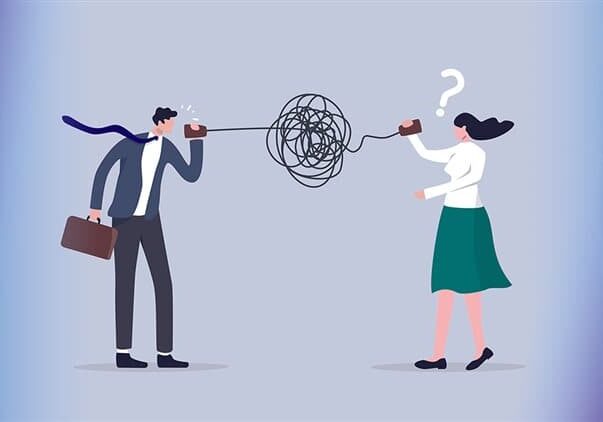Difficult Employee Series: The Poor Communicator

Effective communication is core to any organisation, big or small. In the realm of business, it serves as the foundation, the keystone from which all goals are achieved. Collaboration, decision-making, the generation of new ideas and perspectives; all are impossible without effective communication. Not only that, but a lack of it results in seriously detrimental effects – misunderstandings, decreased productivity, mistakes, toxicity, confusion and errors. In our latest in the difficult employee series, we look at the issues that poor communication can cause, and outline strategies to help those employees who struggle to get their point across.
Poor communication can lead to disaster, as any sports fan will know. The same is equally true in the world of business. But what exactly is the root cause of it? Are certain individuals just bad at relaying information, or is there are a wider set of issues at play?
The Causes of Poor Communication
“Good communication is the bridge between confusion and clarity.”
- Nat Turner
Lack of Clarity
Sometimes, it’s not the employees to blame when communication breaks down; instead, it’s the employers themselves. One of the main causes of poor communication in the workplace is a lack of clarity. Employees may not fully understand their roles and responsibilities, which can lead to confusion and errors. It is crucial for employers to clearly define and communicate each employee’s role and expectations within the organization. This can be done through job descriptions, regular team meetings, and one-on-one discussions.
Poor Listening Skills
Another common issue that leads to poor communication is poor listening skills. It’s all well and good to be able to talk, but to listen requires attentiveness, patience and a sense of calm. In today’s frenzied work environment, employees may feel pressured to respond quickly without fully understanding the words being said. This can lead to misunderstandings, mistakes, and the repetition of misinformation. To combat this, employers can opt for training and resources on active listening techniques, and, perhaps more importantly, set the tone of the business and call for pause when needed and clarification when necessary.
Personal Reasons
The world of modern business is filled with characters from across the globe and of very different mindsets. Variety is the spice of life, or so the saying goes. However, it also means that people’s sensibilities are not the same: some people may be naturally shy, others may struggle with language barriers, while others still simply don’t feel comfortable putting their opinion forward for fear of reproach. As an employer, it is incumbent upon you to make space for these types of individual by offering support and resources. This can come in the form of coaching sessions, language classes or mentorship programmes – each with the aim to allow your staff the tools they need to succeed.
Each of the above causes (and their respective solutions) should be taken seriously. Why? Because the penalties for leaving them unaddressed are manifold.
The Consequences of Poor Communication in Business
“The result of bad communication is a disconnection between strategy and execution.”
- Chuck Martin
Misunderstandings and Errors
Think of the game ‘Chinese Whispers’ that every schoolboy or girl of a certain age might remember: a word or two misheard can lead to calamitous results, as the message becomes more and more distorted. These types of misunderstanding can be very damaging in the realm of business: employees can misinterpret instructions, leading to costly mistakes which can end up with reputational damage and undermine customer trust.
Decreased Productivity
Inefficient communication can significantly reduce productivity. When information is unclear or inaccessible, employees spend valuable time searching for answers instead of focusing on their tasks. Meetings that lack clear agendas or go off-topic can also be a drain of energy, and that most precious of resources, time.
Conflict and Employee Disengagement
Miscommunication can cause conflicts among team members, managers and employees with worrying ease. In turn, unresolved issues and a lack of transparency can foster a toxic work environment, which then causes employee disengagement, increased staff turnover and an overall reduced sense of morale.
Missed Opportunities
‘The one that got away’ happens all the more often if the business flubs its lines, so to speak. Companies that fail to communicate their values, goals, and innovations effectively may struggle to attract investors, clients or talented employees: as such, there’s always an opportunity cost involved.
Strategies for Improving Business-wide Communication
“Like a human being, a company has to have an internal communication mechanism, a ‘nervous system’ to coordinate its actions.”
- Bill Gates
Establish a Clear Communication Strategy
To improve communication, businesses must develop a clear communication strategy. This strategy should outline the company’s communication goals, methods, and channels. It should also define roles and responsibilities for communication within the organization.
Foster a Culture of Openness and Transparency
Companies should encourage openness and transparency in their communication practices. This involves sharing both good news and bad news, as well as being honest about the company’s challenges and objectives. When employees feel that their voices are heard and respected, they are more likely to communicate effectively.
Provide Training and Development
Employers can invest in training programs to enhance communication skills at all levels of the organization. These programs may include workshops on active listening, conflict resolution, and effective email communication. Training can help employees develop the skills necessary to communicate clearly and confidently.
Utilize Technology
Modern technology offers numerous tools to enhance communication. Companies can implement collaboration platforms, messaging apps, and project management software to facilitate real-time communication and information sharing. These tools can streamline processes and ensure that critical information is readily available to employees.
Addressing Individual Employee Communication
“All communication must lead to change.”
- Aristotle
Identify Weaknesses
Employers should actively identify employees who struggle with communication for whatever reason. This can be done through performance evaluations, feedback from colleagues or self-assessment. Recognising the specific communication challenges an individual faces is crucial for tailored improvement strategies, and the first step any employer or manager should take.
Offer Personalised Coaching and Feedback
Individuals who struggle with communication may benefit from one-on-one coaching and feedback. Managers can work closely with these employees to identify their specific weaknesses and develop personalised improvement plans, or can be incorporated as part of a Management by Objectives (MBO) strategy. This type of constructive feedback and ongoing support can help them build the confidence and skills they need to change for the better.
Encourage Peer Mentorship
Establishing a peer mentorship or buddy programme can be an effective way to assist employees who struggle. Experienced colleagues can offer guidance, share best practices and serve as role models; moreover, a good mentor will also have the ability to put their less experienced colleagues at ease and help them come out of their proverbial shell. This type of relationship also fosters a sense of community and allows for practical, on-the-job learning, saving the business precious time.
Provide Resources and Tools
Employers should offer the resources and tools to help employees overcome communication challenges. This may include access to communication courses, books, or online resources. At HR:4UK, we boast a wealth of experience in this regard, and you are able to purchase online training courses directly from us.
These CIPD-approved courses not only help your employees improve, but also display a commitment to their personal and professional development, showcasing a confidence in their ability that many businesses fail to do.
Conclusion
“The art of communication is the language of leadership.”
- James Humes
Effective communication is essential for the success and sustainability of any business. Meanwhile, poor communication can lead to calamity.
Implementing improvement strategies is a vital component in today’s ever more interconnected world for any company. Put simply, those who fail to communicate in the age of the internet fail wholesale.
As such, your business must take the steps necessary – both on an individual as well as macro level – to ensure it isn’t left behind. For further advice on what you can do to help your business (or any particular person within it), don’t hesitate to get in touch with HR:4UK’s dedicated team of trusted, award-winning advisors on 01455 444 222 or email [email protected].
Let us improve your communication, one conversation at a time.
James Dawson
James is our resident wordsmith and has many years of experience in writing about a huge variety of topics from HR to Occupational Health and beyond. He has been published in numerous magazines and news outlets, and especially enjoys researching and analysing the current trends in the modern business world.




